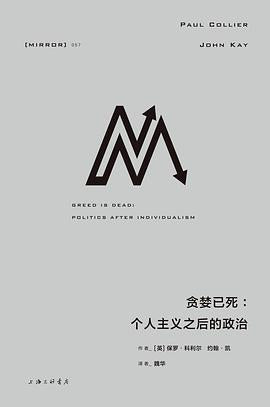WULOLIFE
《贪婪已死》作者: [英]保罗·科利尔 / [英]约翰·凯 出版社: 上海三联书店
《贪婪已死》作者: [英]保罗·科利尔 / [英]约翰·凯 出版社: 上海三联书店
Couldn't load pickup availability
Description
内容简介 · · · · · ·
「内容简介」
我们生活在一个充满自私、物欲横流的社会,怎么能说“贪婪已死”呢?
人被视为天生的趋利动物,每个个体都会为自我实现而争取自身利益。同时人们相信,“经济人”能获得理解世人民就能获得幸福。贪婪,各种形式的贪婪—对知识、财富、繁荣的贪婪,被认为是人类奋发向上的源动力。
数十年后,一场金融风暴和一场大流行彻底改变了一切。傲慢的“经济人”概念破产了:人类掌握的知识并不足以应对巨大的不确定性。随着不平等日益加深、个人主义走向极端,社会陷入了严重撕裂。由贪婪精神开辟的进取道路走入了死胡同。
在本书中,经济学家保罗·科利尔与约翰·凯从社群主义的角度,围绕极端不确定性和社会凝聚力这两个相互交织的主题,回顾了西方战后的政治、经济和商业发展脉络,探问今日世界纷扰动荡的源头与出路。他们提出、市场与社群的角色和关系,方能共渡难关。
「编辑推荐」
★
本书由两位杰出的英国经济学家保罗·科利尔与约翰·凯合作撰写而成,针对等盛行于当代的个人主义、相关观念传统及其引发的社会和经济行为,分析它何以成为人类社会日益走向贫富差距加剧与极化撕裂的罪魁祸首。
★ 重新审视个人主义背后的观念传统,拷问当代思潮之中的关键概念
两位作者回顾了个人主义崛起背后的观念传统,批评性地分析这一传统下的“理性经济人”、财产权、绩优制、身份认同、权利话语等当代社会热议不断的概念,以及它们随着时代演变而产生的变化和偏离后果。
★细数战后西方福利国家的兴衰过程及其背后的政治、政策与观念因素,回溯今日世界之源头
作者从政治局势变化、政策方针以及绩优制盛行带来的观念变化等角度,讲述了战后西方福利国家的兴衰过程,解释战后繁荣与平等的西方社会,何以一步步变成今天这个样子。
★ 用务实的行动方案尝试唤醒人的社会属性
两位经济学家站在社群主义的立场上,借助众多哲学家思想中的社群主义成分,从哲学角度阐释人类的社会性本质,同时结合经济学的具体实例,指出倡导社群主义在当今世界的可行性与紧迫性,呼吁人类的共同行动和通力合作。
作者简介 · · · · · ·
保罗·科利尔(Paul Necklace,英国著名经济学家,前世界银行发展研究部门主任,英国政府顾问,曾获莱昂内尔·吉尔伯奖、克林纳国际书卷奖、亚瑟·罗斯图书奖、埃斯托利尔全球事务杰出著作奖等。著有《最底层的10亿人》《战争、枪炮与选票》《资本主义的未来》等。2010年和2011年被《外交政策》杂志评为“全球百大思想家”。
约翰·凯(John Kay:现任伦敦政治经济学院客座教授、伦敦商学院教授、牛津大学圣约翰学院荣誉研究员、英国国家学术院院士、爱丁堡皇家学会院士。著有《极端不确定性》《市场的真相》等多本著作。
